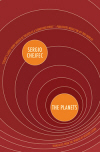The Planets
The Planets, by Argentinian-born writer Sergio Chejfec, is a go-with-the-flow novel that blends the characters walking the streets of Buenos Aires with a contemplation of several subjects like dreams, friendship, memory, and the mysteries in life. What little plot there is involves a friendship between M and the narrator. M is an innocent during the turbulent time of Argentinian political abductions and executions. Living next to the train tracks, M is abducted, disappears, and then is presumably killed by an explosion, which the narrator hears.
The Planets, by Argentinian-born writer Sergio Chejfec, is a go-with-the-flow novel that blends the characters walking the streets of Buenos Aires with a contemplation of several subjects like dreams, friendship, memory, and the mysteries in life. What little plot there is involves a friendship between M and the narrator. M is an innocent during the turbulent time of Argentinian political abductions and executions. Living next to the train tracks, M is abducted, disappears, and then is presumably killed by an explosion, which the narrator hears.
There are no details about the narrator, except that he is writer, and few details about M, except for his house and his discoveries on the train track. M and the narrator, friends since they were teenagers, make it a point to recount stories and ideas as they walk: “I would mention things I had seen, M would describe others.” Even M’s father tells stories. In the philosophical framework, these stories are the most vivid parts, and some of them loop back to stories told earlier. They do not seem to define the friendship, except by implication. The threat of the violent period indicated by the explosion haunts the narrator while he is trying to understand life’s mysteries and define how M’s absence affects him.
M and the narrator exchange photos, while considering each a “talisman” of “questionable representability.” Thus the amorphous nature of their lives becomes a theme. “Everything seemed at once strange and familiar.”
One of M’s most vivid stories has implications for their relationship. In the story, two friends decide to change identities when they go home, not each to his own family but to the friend’s family. Since the parents are also friends, they accept the friend as their own son. Each of the boys uses the other boy’s name as his second name, so that they are already fused.
Identity—which, as they both knew, was one of the most difficult things to discover, obey, preserve, and understand—pulsed erratically within them, moving from one body to the other, shuffled in among names, memories, and beliefs: a commingling only heightened by friendship. They were equivalents. . . . A life of indeterminacy had emptied them of all interests, nothing really mattered; it had been a long time since the future held any tension for them . . . the problem . . . was both superfluous and inevitable, just like the lives of our two heroes.
A real event that M told the narrator involved an eye M found on the train tracks. “The eye to which M wanted to call attention was invisible; it was hidden in a chasm of nature.” It looked like a stone. But there were suicides on the track—another reminder of the violence around them.
M’s second story also has connections with his friend the narrator. It is a story of vagabonds, drifters, who walk in the suburbs of Buenos Aires, much like the narrator and M do: “They had displaced themselves.” They are imprisoned and when they are finally released, it takes them a long time to recognize themselves. They need to reconstruct their images from memory.
They resume their wanderings, like M and the narrator, who “move through the city like planets, following our individual trajectories while we maintain our relative positions and trace our uniform patterns.”
After M’s death, the narrator meets a mutual friend, Sito, whose parentage and occupations the narrator suspects are not true. Sito, however, does explain where the explosion originated—from siphons full of gasoline that he kept in his house. Nevertheless: “My encounter with Sito: so serendipitous it seemed like a dream, which made it obvious that M had been involved.”
The narrator admits to problems for the reader of this book:
I have on occasion wondered whether someone should read this, might think that I am proposing, or hoping to discover, through the image of M, the logic or mystery through which the people have drifted since those years [Argentina’s violent years]. The truth is that there is little to propose and even less to discover.
The novel’s progression is repetitive, circular like the walks themselves. It begins with a dream, which gets repeated later, and ends with memory. But the memory of his friend fades.
It exists only in the form of traces that grow more and more faint. If this is the future of all things, if this is the future of the past. . . . I can’t help but wonder what our role really is. [Yet] . . . we [the friends] were the same . . . we would be conjoined in mutual indistinguishability.
Such ruminations make The Planets a hypnotic, thought-provoking philosophical novel.





